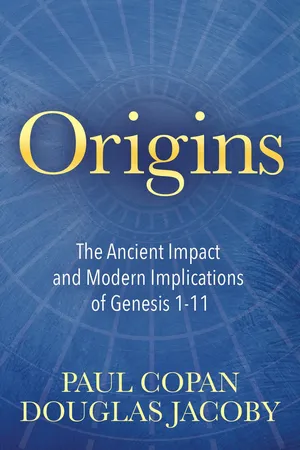
eBook - ePub
Origins
The Ancient Impact and Modern Implications of Genesis 1-11
- English
- ePUB (mobile friendly)
- Available on iOS & Android
eBook - ePub
About this book
"An excellent . . . introduction to the challenges and benefits of reading Genesis 1-11 as a genuinely ancient (specifically ancient Near Eastern) text." —Iain Provon, author of
Seriously Dangerous Religion
Origins turns much of what Christians learned in Sunday School on its head in a revealing comparison of the Genesis narrative to the competing pagan narrative of the day. Relatively few Bible readers are familiar with the world of the ancient Near East, centered in Mesopotamia and its most prominent city, Babylon. The culture, literature, religions, geography, etc. of the early biblical period dramatically influenced what was written and why and without an understanding of these elements, the purposes, meanings, and structure of the text are easily misread by modern readers and reduces the primeval narrative to a collection of Sunday School stories. Origins, while acknowledging the agendas of modern readers, remains on track in expounding on the ancient agenda. Paul Copan and Douglas Jacoby address the doubts of those who find stumbling blocks in early Genesis, facing the tough questions head on and providing biblical solution to many of the "problem passages." Origins surprises and amazes all seekers, new believers, and veterans of Scripture alike as it devastates the polytheistic, pagan assumptions and proclaims the true God.
"A fine addition to the ever-increasing library of books concerning Genesis . . . One also hopes that this volume might be leveraged as an apologetics tool to help those looking for theistic viewpoints on Creation." —Dustin Burlet, Conspectus
"This book can be a helpful apologetic and alternative view for those in the church who have only heard a literal approach to Genesis 1-11 and are looking for something different." — Renew.org
Origins turns much of what Christians learned in Sunday School on its head in a revealing comparison of the Genesis narrative to the competing pagan narrative of the day. Relatively few Bible readers are familiar with the world of the ancient Near East, centered in Mesopotamia and its most prominent city, Babylon. The culture, literature, religions, geography, etc. of the early biblical period dramatically influenced what was written and why and without an understanding of these elements, the purposes, meanings, and structure of the text are easily misread by modern readers and reduces the primeval narrative to a collection of Sunday School stories. Origins, while acknowledging the agendas of modern readers, remains on track in expounding on the ancient agenda. Paul Copan and Douglas Jacoby address the doubts of those who find stumbling blocks in early Genesis, facing the tough questions head on and providing biblical solution to many of the "problem passages." Origins surprises and amazes all seekers, new believers, and veterans of Scripture alike as it devastates the polytheistic, pagan assumptions and proclaims the true God.
"A fine addition to the ever-increasing library of books concerning Genesis . . . One also hopes that this volume might be leveraged as an apologetics tool to help those looking for theistic viewpoints on Creation." —Dustin Burlet, Conspectus
"This book can be a helpful apologetic and alternative view for those in the church who have only heard a literal approach to Genesis 1-11 and are looking for something different." — Renew.org
Frequently asked questions
Yes, you can cancel anytime from the Subscription tab in your account settings on the Perlego website. Your subscription will stay active until the end of your current billing period. Learn how to cancel your subscription.
No, books cannot be downloaded as external files, such as PDFs, for use outside of Perlego. However, you can download books within the Perlego app for offline reading on mobile or tablet. Learn more here.
Perlego offers two plans: Essential and Complete
- Essential is ideal for learners and professionals who enjoy exploring a wide range of subjects. Access the Essential Library with 800,000+ trusted titles and best-sellers across business, personal growth, and the humanities. Includes unlimited reading time and Standard Read Aloud voice.
- Complete: Perfect for advanced learners and researchers needing full, unrestricted access. Unlock 1.4M+ books across hundreds of subjects, including academic and specialized titles. The Complete Plan also includes advanced features like Premium Read Aloud and Research Assistant.
We are an online textbook subscription service, where you can get access to an entire online library for less than the price of a single book per month. With over 1 million books across 1000+ topics, we’ve got you covered! Learn more here.
Look out for the read-aloud symbol on your next book to see if you can listen to it. The read-aloud tool reads text aloud for you, highlighting the text as it is being read. You can pause it, speed it up and slow it down. Learn more here.
Yes! You can use the Perlego app on both iOS or Android devices to read anytime, anywhere — even offline. Perfect for commutes or when you’re on the go.
Please note we cannot support devices running on iOS 13 and Android 7 or earlier. Learn more about using the app.
Please note we cannot support devices running on iOS 13 and Android 7 or earlier. Learn more about using the app.
Yes, you can access Origins by Paul Copan,Douglas Jacoby in PDF and/or ePUB format, as well as other popular books in Theology & Religion & Biblical Commentary. We have over one million books available in our catalogue for you to explore.
Information
ABOUT THE AUTHORS

Paul Copan (PhD Philosophy, Marquette University) is the Pledger Family Chair of Philosophy and Ethics at Palm Beach Atlantic University, West Palm Beach, Florida. For six years, he served as president of the Evangelical Philosophical Society.
Paul is author and editor of over thirty books, including works such as The Rationality of Theism, The Routledge Companion to Philosophy of Religion, Creation out of Nothing, Philosophy of Religion: Classic and Contemporary Issues, The Zondervan Dictionary of Christianity and Science, A Little Book for New Philosophers, and The Cosmological Argument (a two-volume anthology). He has also contributed essays to over thirty books, both scholarly and popular, and he has authored a number of articles in professional journals. In 2017, he was a Visiting Scholar at Oxford University.
Paul and his wife, Jacqueline, have six children and reside in West Palm Beach, Florida. His website is www.paulcopan.com.

Douglas Jacoby is an international Bible teacher, having spoken in over 125 nations (and over 100 universities). After serving as a minister on church staff for 20 years in Britain, Sweden, Australia, and the US, he now works as a freelance teacher and consultant, with a special focus on apologetics.
Douglas has debated numerous well-known atheists, agnostics, imams, and rabbis (like Michael Shermer, Rabbi Shmuley Boteach, and Sheikh Shabir Ally). Since the 1990s he has led annual tours to the biblical world. Douglas has written over 30 books, including Compelling Evidence, Jesus & Islam, Answering Skeptics, and What About Heaven & Hell? and has recorded 600 podcasts. Douglas also serves as Adjunct Professor of Bible and Theology at Lincoln Christian University. He holds degrees from Drew, Harvard, and Duke.
Douglas and his wife, Vicki, have three children, and reside in the Atlanta area. His website is www.douglasjacoby.com.
1. “Bible” was not originally a religious word. It comes simply from the Greek biblion (book), in turn derived from biblos/bublos (scroll or paper). Many, if not most, of the world’s earliest books (examples of what paleographers call a codex) were Bibles. The fact that we even have books in the first place flows substantially from the conviction of the early Christians that the books of the Bible were the word of God—to be published for all to read, hear, and understand.
2. On Paul’s message to the Athenians in both its ancient context and modern application, see Paul Copan and Kenneth D. Litwak, The Gospel in the Marketplace of Ideas: Paul’s Mars Hill Experience for Our Pluralistic World (Downers Grove, IL: IVP Academic, 2014).
3. While the entire NT was written in one language, Greek, the OT was written in two: 99% in Hebrew, 1% in the sister language of Aramaic (Ezra 4:8–6:18; Jer 10:11; Dan 2:4–7:28; and two words in Gen 31:47).
4. The letters YHWH (yodh heth waw heth) are called the Tetragrammaton, Greek for four letters. These four Hebrew consonants are conventionally rendered in English by the four English letters L-O-R-D.
5. Hebrew and OT scholars believe the word was pronounced “Yahweh.” Note that the synthetic “Jehovah” is a forced combination of the consonants of YHWH with the vowels of ’Adônai. (The Masoretic scribes supplied the vowels from ’Adônai, which are a-ô-a. Put together, the word appeared to be pronounced YeHoWaH, or Jehovah.) In other words, the well-known “Jehovah” is found nowhere in the Bible. As for uttering the divine name, unlike Orthodox Jews, who out of reverence dare not pronounce YHWH, substituting instead the word ’Adônai (Lord) or ha-shēm (the Name), Christians are free to say “Yahweh.”
6. Derek Kidner, Genesis: An Introduction & Commentary in Tyndale Old Testament Commentaries (Downers Grove, IL: InterVarsity Press, 1967), 9.
7. We will leave several introductory matters unexplored.
- •One area is authorship. Moses is responsible for part, but not all, of the Torah. And yet the entire Law is attributed to him, in the same way that the book of Psalms as a whole is attributed to David, even though many psalms themselves do not support his direct authorship (naming instead Asaph, Solomon, the Sons of Korah, and others). For more on the authorship of Genesis, see https://www.douglasjacoby.com/?p=16516.
- •Literary (or oral) sources are a second area for another study, and we trust that careful OT scholars who detect sources are as cautious as they are discerning.
- •A third area on which we will only barely touch is the debate about science and Genesis. This is generally uncontroversial among Christians in the biological sciences, and yet it can be highly divisive among believers outside the sciences, or those unfamiliar with genetics, geology, cosmology, and other fields. The fast pace of modern science means that the nonspecialist or general reader can barely manage to keep up with the trends along the frontiers of knowledge.
8. Primeval (Lat. primum, first + aevum, age) means “pertaining to the first age of the world; primitive” (Oxford Abridged Dictionary).
9. However, in the order of the Hebrew canon, this section is “Ruth-less.” Instead, Ruth appears after the book of Proverbs.
10. The hymn “All Hail the Power of Jesus Name” was written by Edward Perronet (1779), music by Oliver Holden (1793).
11. For a fascinating study of the theme of “seed,” see Appendix C, “Genesis Genealogies: Genesis 5, 10–11: The Spreading of the ‘Seed.’”
12. Some scholars recognize 12 toledoth. The account of Esau (Gen 36:1–43) uses the word twice, emphasizing two aspects of Esau’s family, while the initial “genesis,” 1:1–2:3, does not use the word at all. However, in the same way that 1:1–2:3 and 36:1–43 each deal with a single topic, it is better to count 10 toledoth, or geneseis.
13. This “generation” is a sort of personification (though not deification) of heaven and earth. Perhaps the author wanted to emphasize that our ultimate origin is closely connected with the creation itself, although of course not in any pantheistic sense.
14. There are ten generations from Adam to Noah, ten from Noah to Abram. Also notice that Abraham and Joseph are absent from the toledoth formula. As for Abraham, Terah’s line included not just Abraham, but a large number of the personae of Genesis. As for Joseph, keeping in mind that Genesis is written for Jews and from a Jewish perspective, it is fitting that the ten generations terminate in Jacob, the father of the twelve tribes. In this way, the accent is placed on Jacob’s generation—Israel—thus setting the stage for the Exodus. After all, the Exodus involved far more than the two “half-tribes” of Ephraim and Manasseh (the sons of Joseph). All twelve exited Egypt.
15. Three examples will need to suffice. Matthew is built around five tracts of teaching material—paralleling, in all likelihood, the five books of the Torah; Matthew gives the “new” law. Psalms does the same, the Psalter grouped into five books. For an even more striking example, see Ps 119. Even if you can’t read Hebrew, you will easily see the repetition of letters at the beginning of each line in the original text. Lamentations is an acrostic poem. That is, each successive verse begins with the next letter of the...
Table of contents
- Cover
- Title
- Copyright
- Dedication
- Contents
- A Note from the Authors
- I. Orientation
- II. Creation: Chaos to Cosmos
- III. Cycles: Eden to Deluge
- IV. Cleansing: Deluge to Babel
- Postscript: A Caution to Teachers
- Bibliography
- Special Thanks
- About the Authors